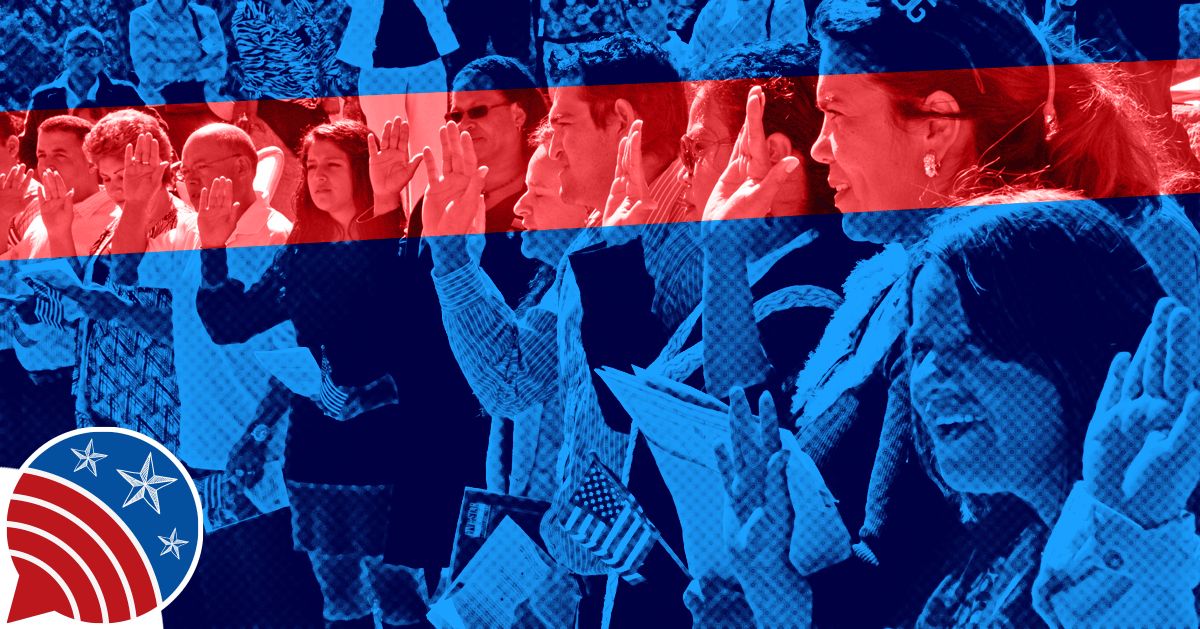
Citizenship
The concept of American citizenship has evolved since America’s founding. Connected to the right to vote, the experience of citizenship has been different for many in America. Explore events, texts, and decisions such as the Chinese Exclusion Act of 1882 to consider the evolution of citizenship in America and its dichotomy of inclusion and exclusion. Prepare to engage in discourse on what makes an American citizen.
Podcasts & Videos
Birthright Citizenship: Citizenship, Part 5
Instructions
- Watch and listen to the 60-Second Civics video below. If you'd like, you can also read along using the script that appears below the quiz. Or you can turn on the video's subtitles and read while watching the video.
- Take the Daily Civics Quiz. If you get the question wrong, watch the video again or read the script and try again.
Episode Description
Dr. Donna Phillips: Welcome to 60-Second Civics, the daily podcast of the Center for Civic Education. I'm Donna Phillips. Today we continue our series on citizenship in America as part of our Civil Discourse: An American Legacy project. We are joined by special guest Professor Henry L. Chambers Jr of University of Richmond School of Law. Welcome back, Professor Chambers.
Professor Henry L. Chambers Jr: Good to see you.
Dr. Donna Phillips: Thank you. You too. Professor Chambers, what is birthright citizenship and how do you see American citizenship in the future?
Professor Henry L. Chambers Jr: Yeah, birthright citizenship is citizenship under the 14th Amendment. Essentially, it says if you are born in the United States, then you are a citizen as at the moment you are born. And the notion is that anybody who's born here, generally speaking, to parents who are not necessarily subject to another foreign power, you're going to be a citizen of the United States.
Essentially, you're one of us. The way it oftentimes pops up in a way it's controversial is when you have folks who may be undocumented, who are here, who ostensibly are not supposed to be here, who have children. Those children are still considered U.S. citizens because they were born here. How might that change in the future? Well, you do have some folks who are arguing that maybe birthright citizenship under the 14th Amendment should be reinterpreted in a way that doesn't automatically provide citizenship to folks born here.
But I suspect that that is going to be the birthright citizenship is going to continue to be the way we think about citizenship for a long time. One question, though, does become whether the historical rights given to citizens should continue to be given to citizens and only citizens. For example, should we allow noncitizens to vote in certain elections?
How citizenship is going to be defined moving forward is going to be fascinating.
Dr. Donna Phillips: Absolutely. It's been a pleasure having you on the show, Professor Chambers. That's all for today's podcast. 60-Second Civics, where civic education only takes a minute.
Professor Henry L. Chambers Jr: Good to see you.
Dr. Donna Phillips: Thank you. You too. Professor Chambers, what is birthright citizenship and how do you see American citizenship in the future?
Professor Henry L. Chambers Jr: Yeah, birthright citizenship is citizenship under the 14th Amendment. Essentially, it says if you are born in the United States, then you are a citizen as at the moment you are born. And the notion is that anybody who's born here, generally speaking, to parents who are not necessarily subject to another foreign power, you're going to be a citizen of the United States.
Essentially, you're one of us. The way it oftentimes pops up in a way it's controversial is when you have folks who may be undocumented, who are here, who ostensibly are not supposed to be here, who have children. Those children are still considered U.S. citizens because they were born here. How might that change in the future? Well, you do have some folks who are arguing that maybe birthright citizenship under the 14th Amendment should be reinterpreted in a way that doesn't automatically provide citizenship to folks born here.
But I suspect that that is going to be the birthright citizenship is going to continue to be the way we think about citizenship for a long time. One question, though, does become whether the historical rights given to citizens should continue to be given to citizens and only citizens. For example, should we allow noncitizens to vote in certain elections?
How citizenship is going to be defined moving forward is going to be fascinating.
Dr. Donna Phillips: Absolutely. It's been a pleasure having you on the show, Professor Chambers. That's all for today's podcast. 60-Second Civics, where civic education only takes a minute.







